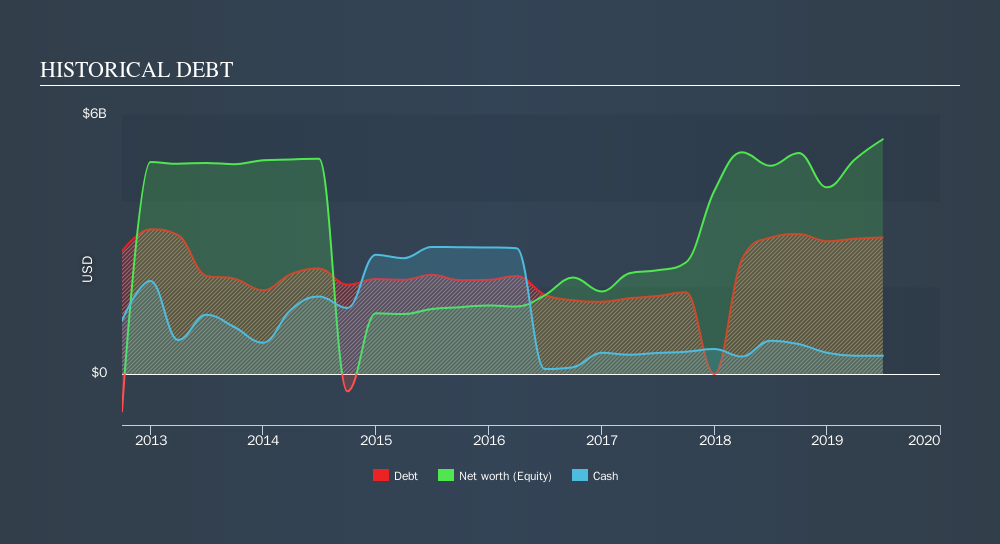
Legendary fund manager Li Lu (who Charlie Munger backed) once said, 'The biggest investment risk is not the volatility of prices, but whether you will suffer a permanent loss of capital.' So it might be obvious that you need to consider debt, when you think about how risky any given stock is, because too much debt can sink a company. We note that GCI Liberty, Inc. (NASDAQ:GLIB.A) does have debt on its balance sheet. But the real question is whether this debt is making the company risky.
Why Does Debt Bring Risk?
Debt is a tool to help businesses grow, but if a business is incapable of paying off its lenders, then it exists at their mercy. Part and parcel of capitalism is the process of 'creative destruction' where failed businesses are mercilessly liquidated by their bankers. However, a more usual (but still expensive) situation is where a company must dilute shareholders at a cheap share price simply to get debt under control. Of course, plenty of companies use debt to fund growth, without any negative consequences. When we examine debt levels, we first consider both cash and debt levels, together.
View our latest analysis for GCI Liberty
What Is GCI Liberty's Net Debt?
The chart below, which you can click on for greater detail, shows that GCI Liberty had US$3.15b in debt in June 2019; about the same as the year before. On the flip side, it has US$422.9m in cash leading to net debt of about US$2.73b.

How Strong Is GCI Liberty's Balance Sheet?
Zooming in on the latest balance sheet data, we can see that GCI Liberty had liabilities of US$1.08b due within 12 months and liabilities of US$4.07b due beyond that. On the other hand, it had cash of US$422.9m and US$175.3m worth of receivables due within a year. So it has liabilities totalling US$4.55b more than its cash and near-term receivables, combined.
This is a mountain of leverage relative to its market capitalization of US$6.71b. This suggests shareholders would heavily diluted if the company needed to shore up its balance sheet in a hurry. When analysing debt levels, the balance sheet is the obvious place to start. But ultimately the future profitability of the business will decide if GCI Liberty can strengthen its balance sheet over time. So if you want to see what the professionals think, you might find this free report on analyst profit forecasts to be interesting.
In the last year GCI Liberty managed to grow its revenue by 185%, to US$880m. So there's no doubt that shareholders are cheering for growth
Caveat Emptor
Despite the top line growth, GCI Liberty still had negative earnings before interest and tax (EBIT), over the last year. Indeed, it lost US$81m at the EBIT level. When we look at that and recall the liabilities on its balance sheet, relative to cash, it seems unwise to us for the company to have any debt. Quite frankly we think the balance sheet is far from match-fit, although it could be improved with time. However, it doesn't help that it burned through US$73m of cash over the last year. So suffice it to say we do consider the stock to be risky. For riskier companies like GCI Liberty I always like to keep an eye on whether insiders are buying or selling. So click here if you want to find out for yourself.
If, after all that, you're more interested in a fast growing company with a rock-solid balance sheet, then check out our list of net cash growth stocks without delay.
We aim to bring you long-term focused research analysis driven by fundamental data. Note that our analysis may not factor in the latest price-sensitive company announcements or qualitative material.
If you spot an error that warrants correction, please contact the editor at editorial-team@simplywallst.com. This article by Simply Wall St is general in nature. It does not constitute a recommendation to buy or sell any stock, and does not take account of your objectives, or your financial situation. Simply Wall St has no position in the stocks mentioned. Thank you for reading.
Market Insights
Community Narratives





